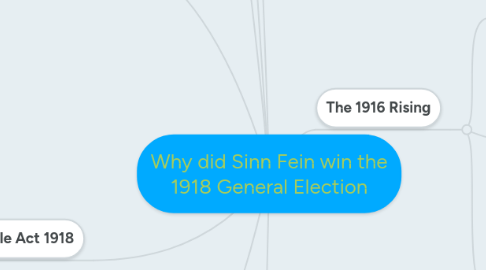Why did Sinn Fein win the 1918 General Election
作者:Toni Shields


1. Support from other orginisations
1.1. The representatives were also very active in other organisations like the Gaelic League and the Volunteers and the GAA. This was a throwback to the policies of the IRB, which infiltrated all major organisations. This network meant that cultural nationalists were exposed to, and surrounded by, these political nationalists, Sinn Fein members, and so were influenced to vote for them. They were in 1918 thousands involved in organisations like the GAA and Gaelic League and the Irish Literary Society
2. The German Plot
2.1. Public Sympathy for Sinn Fein was also aroused by government interference in the electoral process. The ‘German Plot’ was apparently discovered by Dublin Castle and, so, the leaders of Sinn Fein (de Valera, Arthur Griffith) were imprisoned and organisations like the Gaelic league, the volunteers were prohibited. So during the election many Sinn Fein candidates were in prison, which led to a swelling of their support in sympathy
3. Labour's failure to contest
3.1. decided not to contest the election. It did this so as to offer to the Irish people a clear-cut choice between the IPP and Sinn Fein, between Home Rule and abstention and a rival parliament. The effect of this was that the working class and trade unionists who would have voted labour in fact, in the main, voted for Sinn Fein. Labour’s decision prevented a split in the vote basically and was very advantageous to Sinn Feinn
4. Decline of IPP
4.1. The Irish Parliamentary Party was by now seen as a staid, conservative party and very firmly associated with the House of Commons, which had failed to deliver Home Rule. The IPP was led by John Dillon, aged 70, and did not have the glamour associated with the revolutionary Sinn Fein. The fact that the partition of Ireland had been accepted as unavoidable by John Redmond, the previous leader, at the Buckingham Palace Conference of 1914, also lost them support. Sinn Fein were then in favour of independence for the whole of Ireland
4.2. 1917 Boycott
4.2.1. This conference ended in failure with no agreement reached. It was a very public failure and it reinforced the association of the IPP and failure. The fact that Sinn Fein boycotted and so were not associated with the failure, and could in fact criticise the IPP, meant further boosts to Sinn Fein’s popularity
